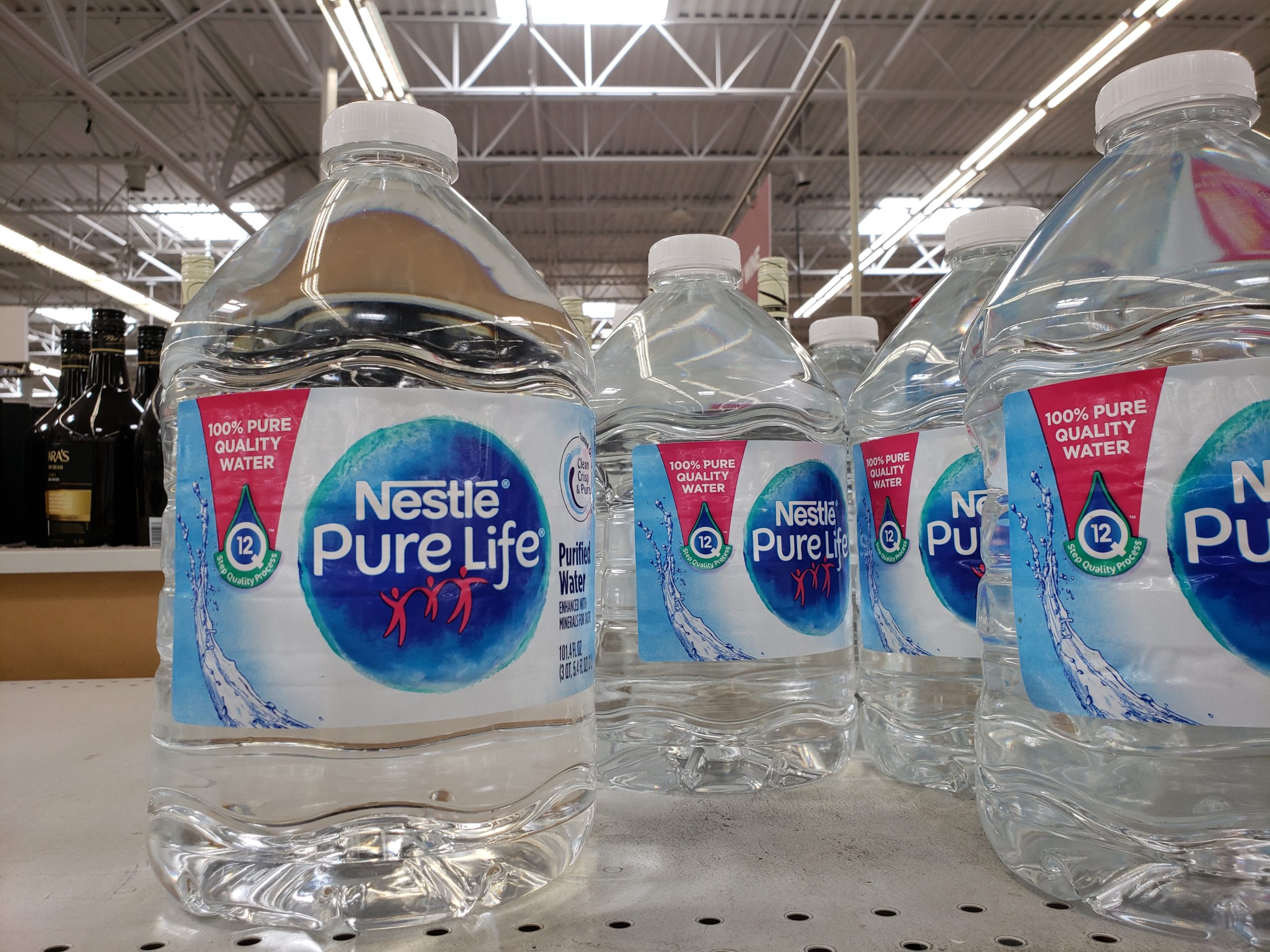
An administrative law judge ruled this week in favor of Nestle in the long-running dispute over whether the company would be allowed to increase its withdrawals of groundwater to support its water bottling operation in Michigan.
Grassroots activists challenged the 2018 decision by Michigan’s then Department of Environmental Quality under former Gov. Rick Snyder.
The groups, Michigan Citizens for Water Conservation and the Grand Traverse Band of Ottawa and Chippewa Indians, said the original decision was based on “basic flaws in allowing computer models to override the real time data,” on the impact of the withdrawals, according to Peggy Case, MCWC president.
But Snyder justified the decision days before leaving office.
“It’s important that we follow the law,” Snyder said in a December 2018 Great Lakes Now interview. The question is whether the withdrawal would negatively impact the aquifer and the science said it wouldn’t, Snyder said.
Administrative Law Judge Daniel Pulter agreed.
“I find, as a Matter of Fact, that Nestlé has certified that it is in compliance with environmentally sound and economically feasible water conservation measures developed by the applicable water user’s sector,” Pulter wrote in a 71-page ruling.
Pulter also found that Nestle’s withdrawals are “reasonable under common law principles of water law in Michigan” and that Nestle demonstrated that it would take action to address the impact of its withdrawals if necessary.
Nestle praised the law judge’s decision calling it “carefully reviewed and considered” in a statement.
“We have confidence in the science behind our application, the Department of Environment Great Lakes and Energy’s thorough review, the 18 years’ worth of environmental data collected near the site since beginning our operations in Michigan, and EGLE’s analysis.”
API key not valid. Please pass a valid API key.Statute vs. public opinion
“This month’s decision by the Administrative Law Judge speaks for itself,” EGLE spokesperson Scott Dean said.
“The recommendation of Judge Pulter is subject to a final determination by the Director of EGLE,” Dean said and that “EGLE will conduct a thorough review of the recommendation prior to any comment or decision.”
EGLE director Liesl Clark said in a 2019 Great Lakes Now interview that her decision “needs to meet with our values, our mission of protecting the environment and public health and managing wisely our resources.”
She said the administration of Gov. Gretchen Whitmer has a priority to listen to “the voices of what I think of as our 10 million bosses, the people of the state of Michigan.”
But Clark said EGLE is a creature of statute and “statute does not create a lot of swaying of the decision based on public opinion.”
Public comments on the original 2018 decision were 80,000 against approval of the water withdrawal permit compared to less than 100 in favor.
A step in the process
Traverse City water law attorney Jim Olson, whose firm represented MCWC in the case, said it’s important to know that the law judge works for the agency and that they rarely overturn an agency’s approval of a permit.
It’s a step in the process that now allows the plaintiffs to take legal action in court.
But Olson expressed disappointment in Gov. Whitmer and EGLE for not correcting the “foot-loose interpretations of the water withdrawal and bottled water standards by the Snyder administration in approving the permit in the first place.”
Olson said many organizations pointed out the bad precedent set by the Snyder administration.
“It’s disappointing, to say the least, that our new leadership ignored the work of part of their own constituency,” Olson said.
In her 2018 election campaign Whitmer raised expectations that, if elected, she’d take a different approach to water withdrawals for bottled water.
Under a water conservation heading on her campaign website Whitmer said “… we need a way to control the siphoning of water for water bottling and my administration will work to see it done.”
National perspective
Mary Grant said Whitmer has not addressed the inequity in Michigan’s handling of bottled water. Grant monitors bottled water issues for national watchdog Food and Water Watch.
“For a mere $200, Nestlé is extracting millions of gallons of water a year in Michigan to sell for profit in pricy and environmentally polluting plastic bottles, while many Michigan communities including Flint and Detroit continue to face dauntingly unaffordable water bills,” Grant said.
“This is a deep injustice that Governor Whitmer has failed to address,” according to Grant.
In spite of the legal setback, MCWC’s Case said the group will continue to fight against the privatization of the waters of the Great Lakes basin.
“We were not surprised that our efforts did not result in victory in the court of EGLE, even after a lengthy and expensive legal battle. In the court of public opinion, we had won long ago,” she said.
Catch up on Great Lakes Now‘s coverage of water withdrawal issues:
Third Rail Proposal: Selling Great Lakes water proposed to lower lake levels
Great Lakes Energy News Roundup: Toxic coal ash, utility company water withdrawal, Line 5
Featured image: Nestlé Pure Life bottled water (Photo Credit: Natasha Blakely)
1 Comment
-
Thank you for reporting on this. These news bits are so buried in the everyday news cycles, especially recently. I think our water and the conservation of our water is vitally important to our region and to the peoples who reside here. This is such a harsh reality.




